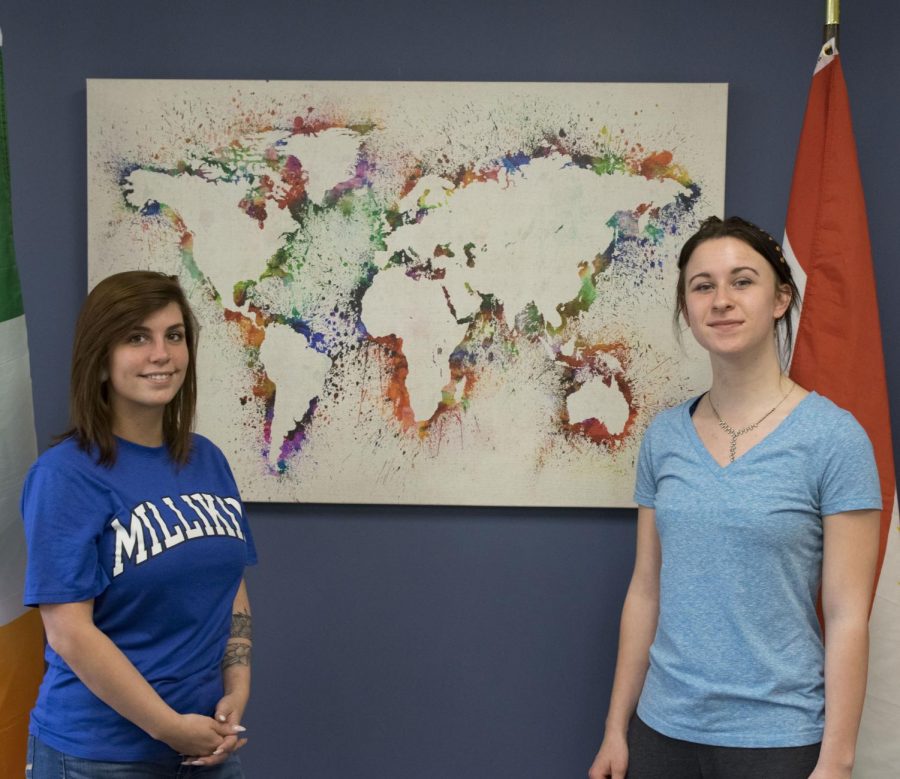International Citizenship and Leadership in the CIE
Millikin University marked March 19-24 as a week for “Celebrating the Commons.” Each day, students and members of the community filled every available space with discussions dedicated to the event’s theme of leadership.
Wednesday, March 21 marked the Oberhelman Student Leadership Conference. To participate in the event, the Center for International Education, or the CIE, hosted a panel discussion and a presentation to inform attendees about various aspects regarding global citizenship, particularly how to gain employment and leadership qualities from international experiences.
The CIE’s first panel discussion, held at 10 AM, included members of Resident Life’s International Fellowship Program Jordi Sitja and Laura Borofull from Spain, Sara Guyot and Marie Malvina Voisard from France, Jheeyuk Park from South Korea and Nick Cravatta from the United States. The fellowship is a program created to increase interaction between domestic and international students.
“Our program has been around for 2-3 years,” Nicole DeLiberis, Residential Communities Coordinator, said. “We pair students together so we can help international students transition into what it is like to be in US culture.”
The students first shared the challenges they faced when first learning to live with students from other cultures, which primarily included confusions about when to eat meals among other issues related to language barriers and cultural differences.
Miscommunications, however, did not stop the panelists from acknowledging the positive aspects of the program.
One of the advantages fellowship provides is it benefits American students who have not studied abroad but want to learn from interacting with other cultures.
“I’m being introduced to different cultures and different ways of thinking and I think that’s an important thing in job interviews to say, that I’m more culturally-competent.” Cravatta, Sitja’s roommate, said.
Though factors such as language barriers and cultural differences cause difficulty at first, international students who live with domestic students benefit in the long run since employers in their home countries commonly value the ability to speak English well.
“In Spain, studying in the U.S. is one of the best points you can have in your curriculum. It opens a lot of doors to find a job because you’ve been practicing English and English in Spain—and all of Europe in general—is really important.” Borofull said.
Using global experiences in a résumé also became a major point in the panel discussion and created the focus of the following presentation, titled, “Milliventures: The Art of Articulating International Experiences for the Workforce.”
“Students want to be able to use their study abroad experience to their advantage.” Briana Stephens-Quintenz, the International Student Services Coordinator for the CIE, said.
The presentation featured stories about alumni Haley Hogenkamp, Lauren Ingram and Ashleigh Martens, who studied abroad with Millikin and used their experiences to begin their careers.
Ingram, a graduated biology student, currently lives in the city center of Madrid and works as an English Assistant in a high school, teaching English to students in Spain. She plans on going to graduate school in Spain for International Education, where she will take graduate courses and student-teach at the same time.
Martens, a graduated BFA Acting Major from Canada and found that her experiences with Millikin’s London Semester with the Shakespeare Globe Theater stood out on her résumé and spurred conversations in her interviews.
“Most people outside, especially people in higher administrative positions, have travelled. You want to make connections in interviews and things like that. It’s a nice foothold.” Martens said in a recording of a skype interview
She currently works as a key-holder for a coffee shop in Vancouver, but recently signed a contract with an agent who will match Martens with opportunities to work on television programs and other projects in the British Colombia region.
Hogenkamp currently works in the Peace Corps in Macedonia. When it comes to the Peace Corps, they specifically seek out individuals who demonstrate strong leadership qualities and ability to interact with new cultures.
Macedonia is a developing country, which might seem intimidating to many Americans, but Hogenkamp saw it as an opportunity to make an impact. She will live there for two years and work with both Macedonians and other members of the Peace Corps to further develop the fledgling democracy.
All students involved in the past or present with the CIE are currently global citizens. Participating in Celebrating the Commons spread their insight helped them share their insight into making progress in society from forming connections with new cultures.
…
Note: This online article contains a correction to the printed paper. Briana Stephens-Missoura’s real name is Briana Quintenz. I am sorry for the mistake and I appreciate Decaturian readers for understanding.

